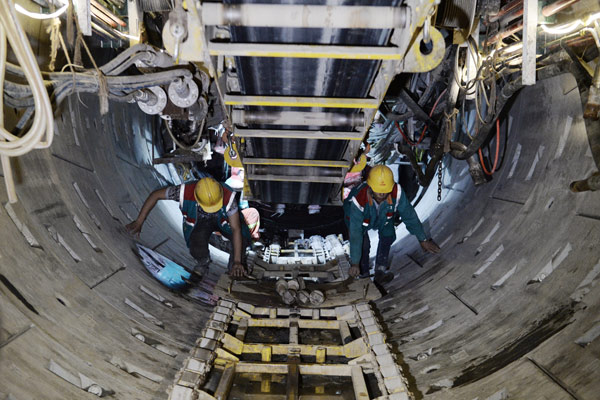 |
|
Workers at the construction site of the Huaifang Water Recycling Plant in Beijing's Fengtai district. [Photo by Hao Yi/For China Daily] |
The largest underground water recycling plant in Asia is expected to be completed in Beijing by the end of June, according to the Beijing Drainage Group, a large public-service enterprise in the capital and the operator of the plant.
The Huaifang Water Recycling Plant, which will be capable of recycling 200 million cubic meters of sewage a year and able to treat most wastewater from Beijing's western urban area, will contribute greatly to the city's environmental protection, according to the city's publicity department.
The facility, which is located in the capital's southwest, was built underground to save valuable land. It occupies an area of more than 16 hectares and is equipped with cutting-edge technology, the group said.
The plant will be used to treat both industrial and household wastewater and transform it into water that reaches environmental protection standards. The recycled water will be used for industrial and commercial purposes in nearby areas and also to replenish nearby waterways.
In addition, a wetland park of the same size as the underground water treatment plant will be built on the surface. The park will be fed by recycled water from the plant, the group said.
Wastewater flowing into the plant will be treated in various ways, which will include filtration, biological degradation of chemicals and sterilization with ultraviolet rays, said Wang Yabin, an electrical engineer involved with the project.
The development was the largest water treatment project among several listed in a three-year plan released by the Beijing municipal government in 2013.
The capital is short of water, with per-capita resources only standing at about 150 cubic meters, far less than the national average, according to the government.
Last year, an additional 1 billion cubic meters of fresh water was supplied to Beijing through the south-north water diversion project, a massive program to divert water from the Yangtze River to North China.
Under a plan for wastewater treatment and reuse facilities that was released by the city in January, Beijing will build 27 new water recycling plants and install and upgrade 1,081 kilometers of sewage pipelines during the next three years.
wangxiaodong@chinadaily.com.cn
